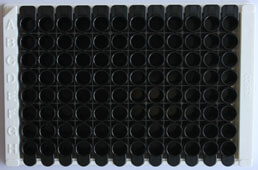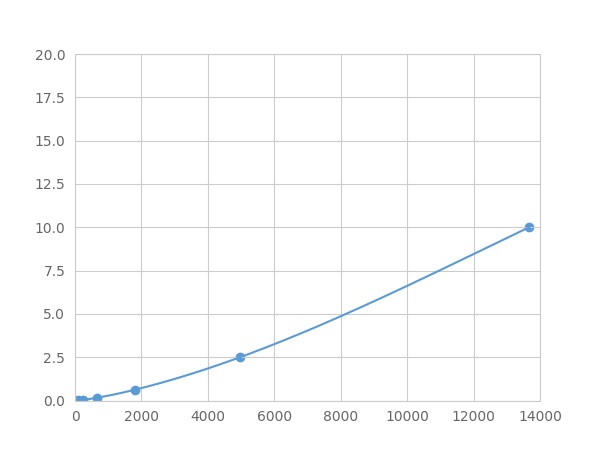Packages (Simulation)

Reagent Preparation

Image (I)
Image (II)
Certificate


Multiplex Assay Kit for Factor Related Apoptosis Ligand (FASL) ,etc. by FLIA (Flow Luminescence Immunoassay)
CD178; CD95L; CD95-L; FASLG; FASLG; APT1LG1; APT1-LG1; TNFSF6; Fas Antigen Ligand; TNF Superfamily Member 6; Tumor Necrosis Factor(ligand)Superfamily,Member 6
(Note: Up to 8-plex in one testing reaction)
- Product No.LMA031Mu
- Organism SpeciesMus musculus (Mouse) Same name, Different species.
- Sample TypeSerum, plasma, tissue homogenates, cell lysates, cell culture supernates and other biological fluids
- Test MethodDouble-antibody Sandwich
- Assay Length3.5h
- Detection Range0.01-10ng/mL
- SensitivityThe minimum detectable dose of this kit is typically less than 0.003 ng/mL.
- DownloadInstruction Manual
- UOM 8Plex 7Plex 6Plex 5Plex 4Plex 3Plex 2Plex1Plex
- FOB
US$ 348
US$ 362
US$ 382
US$ 409
US$ 436
US$ 476
US$ 536
US$ 670
Add to Price Calculator
Result
For more details, please contact local distributors!
Specificity
This assay has high sensitivity and excellent specificity for detection of Factor Related Apoptosis Ligand (FASL) ,etc. by FLIA (Flow Luminescence Immunoassay).
No significant cross-reactivity or interference between Factor Related Apoptosis Ligand (FASL) ,etc. by FLIA (Flow Luminescence Immunoassay) and analogues was observed.
Recovery
Matrices listed below were spiked with certain level of recombinant Factor Related Apoptosis Ligand (FASL) ,etc. by FLIA (Flow Luminescence Immunoassay) and the recovery rates were calculated by comparing the measured value to the expected amount of Factor Related Apoptosis Ligand (FASL) ,etc. by FLIA (Flow Luminescence Immunoassay) in samples.
| Matrix | Recovery range (%) | Average(%) |
| serum(n=5) | 97-105 | 102 |
| EDTA plasma(n=5) | 86-93 | 90 |
| heparin plasma(n=5) | 89-101 | 96 |
| sodium citrate plasma(n=5) | 83-103 | 97 |
Precision
Intra-assay Precision (Precision within an assay): 3 samples with low, middle and high level Factor Related Apoptosis Ligand (FASL) ,etc. by FLIA (Flow Luminescence Immunoassay) were tested 20 times on one plate, respectively.
Inter-assay Precision (Precision between assays): 3 samples with low, middle and high level Factor Related Apoptosis Ligand (FASL) ,etc. by FLIA (Flow Luminescence Immunoassay) were tested on 3 different plates, 8 replicates in each plate.
CV(%) = SD/meanX100
Intra-Assay: CV<10%
Inter-Assay: CV<12%
Linearity
The linearity of the kit was assayed by testing samples spiked with appropriate concentration of Factor Related Apoptosis Ligand (FASL) ,etc. by FLIA (Flow Luminescence Immunoassay) and their serial dilutions. The results were demonstrated by the percentage of calculated concentration to the expected.
| Sample | 1:2 | 1:4 | 1:8 | 1:16 |
| serum(n=5) | 83-102% | 91-103% | 78-101% | 87-96% |
| EDTA plasma(n=5) | 96-104% | 89-102% | 88-102% | 88-97% |
| heparin plasma(n=5) | 98-105% | 87-105% | 95-102% | 99-105% |
| sodium citrate plasma(n=5) | 78-96% | 80-98% | 78-95% | 96-104% |
Stability
The stability of kit is determined by the loss rate of activity. The loss rate of this kit is less than 5% within the expiration date under appropriate storage condition.
To minimize extra influence on the performance, operation procedures and lab conditions, especially room temperature, air humidity, incubator temperature should be strictly controlled. It is also strongly suggested that the whole assay is performed by the same operator from the beginning to the end.
Reagents and materials provided
| Reagents | Quantity | Reagents | Quantity |
| 96-well plate | 1 | Plate sealer for 96 wells | 4 |
| Pre-Mixed Standard | 2 | Standard Diluent | 1×20mL |
| Pre-Mixed Magnetic beads (22#:FASL) | 1 | Analysis buffer | 1×20mL |
| Pre-Mixed Detection Reagent A | 1×120μL | Assay Diluent A | 1×12mL |
| Detection Reagent B (PE-SA) | 1×120μL | Assay Diluent B | 1×12mL |
| Sheath Fluid | 1×10mL | Wash Buffer (30 × concentrate) | 1×20mL |
| Instruction manual | 1 |
Assay procedure summary
1. Preparation of standards, reagents and samples before the experiment;
2. Add 100μL standard or sample to each well,
add 10μL magnetic beads, and incubate 90min at 37°C on shaker;
3. Remove liquid on magnetic frame, add 100μL prepared Detection Reagent A. Incubate 60min at 37°C on shaker;
4. Wash plate on magnetic frame for three times;
5. Add 100μL prepared Detection Reagent B, and incubate 30 min at 37°C on shaker;
6. Wash plate on magnetic frame for three times;
7. Add 100μL sheath solution, swirl for 2 minutes, read on the machine.
GIVEAWAYS
INCREMENT SERVICES
| Magazine | Citations |
| PLoS Pathogens | Macrophage-expressed IFN-β Contributes to Apoptotic Alveolar Epithelial Cell Injury in Severe Influenza Virus Pneumonia PubMed: PMC3585175 |
| Tumor Biology | The diplotype Fas? 1377A/? 670G as a genetic marker to predict a lower risk of breast cancer in Chinese women Springer:Source |
| IOS Press Content Library | An Intranasal Formulation of Erythropoietin (Neuro-EPO) Prevents Memory Deficits and Amyloid Toxicity in the APPSwe Transgenic Mouse Model of Alzheimer's … articles:journal-of-alzheimers-disease |
| 博士论文 | INSTITUTO DE CIENCIAS BÁSICAS Y PRECLÍNICAS “VICTORIA DE GIRÓN” DEPARTAMENTO DE HISTOLOGÍA |
| Catalog No. | Related products for research use of Mus musculus (Mouse) Organism species | Applications (RESEARCH USE ONLY!) |
| RPA031Mu02 | Recombinant Factor Related Apoptosis Ligand (FASL) | Positive Control; Immunogen; SDS-PAGE; WB. |
| EPA031Mu62 | Eukaryotic Factor Related Apoptosis Ligand (FASL) | Positive Control; Immunogen; SDS-PAGE; WB. |
| APA031Mu61 | Active Factor Related Apoptosis Ligand (FASL) | Cell culture; Activity Assays. |
| EPA031Mu61 | Eukaryotic Factor Related Apoptosis Ligand (FASL) | Positive Control; Immunogen; SDS-PAGE; WB. |
| RPA031Mu01 | Recombinant Factor Related Apoptosis Ligand (FASL) | Positive Control; Immunogen; SDS-PAGE; WB. |
| PAA031Mu02 | Polyclonal Antibody to Factor Related Apoptosis Ligand (FASL) | WB; IHC; ICC; IP. |
| PAA031Mu01 | Polyclonal Antibody to Factor Related Apoptosis Ligand (FASL) | WB |
| SEA031Mu | ELISA Kit for Factor Related Apoptosis Ligand (FASL) | Enzyme-linked immunosorbent assay for Antigen Detection. |
| SCA031Mu | CLIA Kit for Factor Related Apoptosis Ligand (FASL) | Chemiluminescent immunoassay for Antigen Detection. |
| LMA031Mu | Multiplex Assay Kit for Factor Related Apoptosis Ligand (FASL) ,etc. by FLIA (Flow Luminescence Immunoassay) | FLIA Kit for Antigen Detection. |
| KSA031Mu01 | ELISA Kit DIY Materials for Factor Related Apoptosis Ligand (FASL) | Main materials for "Do It (ELISA Kit) Yourself". |





